Adam Frank
Adam Frank was a contributor to the NPR blog 13.7: Cosmos & Culture. A professor at the University of Rochester, Frank is a theoretical/computational astrophysicist and currently heads a research group developing supercomputer code to study the formation and death of stars. Frank's research has also explored the evolution of newly born planets and the structure of clouds in the interstellar medium. Recently, he has begun work in the fields of astrobiology and network theory/data science. Frank also holds a joint appointment at the Laboratory for Laser Energetics, a Department of Energy fusion lab.
Frank is the author of two books: The Constant Fire, Beyond the Science vs. Religion Debate (University of California Press, 2010), which was one of SEED magazine's "Best Picks of The Year," and About Time, Cosmology and Culture at the Twilight of the Big Bang (Free Press, 2011). He has contributed to The New York Times and magazines such as Discover, Scientific American and Tricycle.
Frank's work has also appeared in The Best American Science and Nature Writing 2009. In 1999 he was awarded an American Astronomical Society prize for his science writing.
-
Physicist Carlo Rovelli is unique among modern scientists who write for popular audiences in his ability to capture the purest essence of his science with both precision and lyricism.
-
Danny Fingeroth spends some time unpacking Lee's long-running dispute with Jack Kirby and others over ownership, but mainly offers strong insights into the forces that drove Lee and Marvel to success.
-
The physicist dives into fraught territory, taking up the age-old debate over quantum mechanics — aiming to convince readers that the Many Worlds interpretation is the one that describes reality.
-
If you want to see what that future might look like, David Ewing Duncan's book is a fun place to start; he envisions various bots based on interviews with scientists and engineers, among others.
-
These works make apparent how singular an achievement America's moon landing was — and show that half a century later we're still grappling to understand its long-term meaning.
-
A century after the birth of quantum mechanics, no one is sure what it is telling us about the nature of reality — and Lee Smolin's book adds to a stream of excellent works on the topic.
-
Does mess drive you nuts? Astrophysicist Adam Frank says to think of it as showing off — all proteins need mess to do their own work.
-
David Wallace-Wells' The Uninhabitable Earth and Nathaniel Rich's Losing Earth offer valuable perspectives on climate change — if we're committed to being adult enough to face the future.
-
Douglas Rushkoff's knowledge of digital technology shines in his new book, horrifying us with the capacities of the machines we've built — and the ways they have been used against us.
-
Commentator Adam Frank interviews physicist Clifford Johnson, who has taken a new approach to the exploration of questions about the nature of the universe — the graphic novel.
-
Hidden in the narratives of 1970s comics like the Black Panther was an idea that grew like a seed in the imagination of kids like me: Science and heroism were indelibly linked, says Adam Frank.
-
From its first appearance, Star Trek has always been hopeful about the relationship between society and technology. Ethan Siegel doesn't lose sight of this in his book, Treknology, says Adam Frank.




